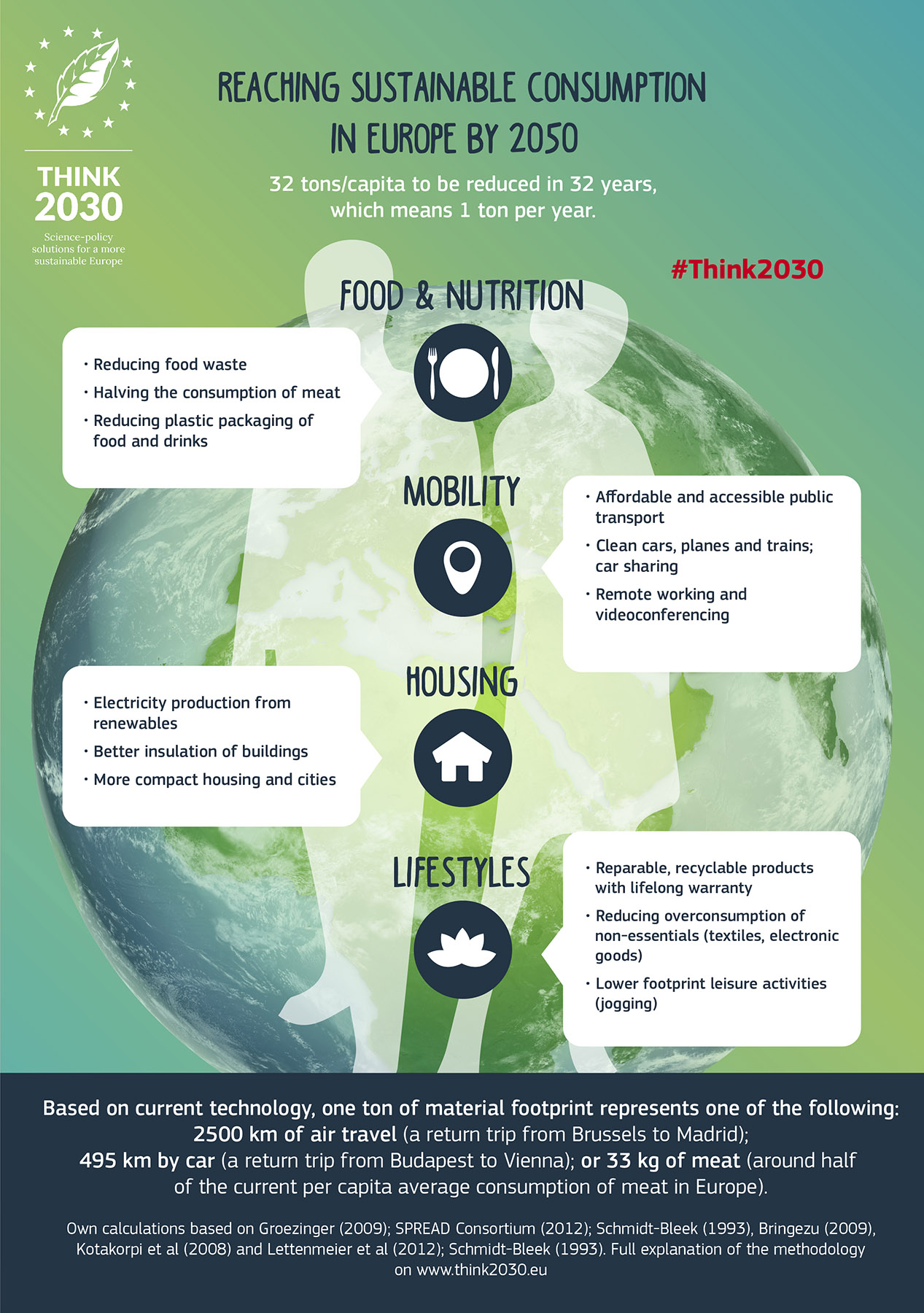On the eve of Black Friday, Think2030, a platform of sustainability experts from think tanks, NGOs, local authorities and corporations, is calling for a comprehensive European policy on sustainable consumption.
| We are calling for sustainable consumption policies to be at the heart of the European Green Deal |
“Rather than blaming consumers, it is time for decision-makers and corporate leaders to take on the responsibility,” said Céline Charveriat, IEEP Executive Director and one of the founders of Think2030. “European policies must go well beyond green labelling and ensure that all products and services are safe for consumers and the planet. This is why we are calling for sustainable consumption policies to be at the heart of the European Green Deal.
“Our overconsumption of non-essential goods is leading us to destroying forests and nature in Europe and elsewhere, while also polluting the air, soil and water, which we depend on for our own survival,” Charveriat added. “If we fail to reign in on over-consumption, the global fight for natural resources will get out of control way before 2050. We have little time or natural resources to waste. Our health, our peace and security are at risk.”
Why is Black Friday a key sustainability challenge?
Black Friday encourages the overconsumption of non-essential goods – from fast fashion to electrical appliances or electronic goods. These products represent 21% of the material footprint of European consumers. It is the least essential part of our consumption, compared with housing, mobility and nutrition, all of which address our essential needs.
 |
Our planet’s resources are finite, and yet the way we consume them today – at a high rate and along a largely linear trajectory – is not sustainable. In the simplest terms, if everyone around the world were to consume like Europeans, we would need three Earths’ worth of natural resources to maintain our way of life (IEEP, 2018).
The material footprint of Europeans varies between 27 and 40 tonnes per capita per year (Groeziner et al.). Bulgarians, Hungarians, Latvians, Croatians and Estonians are the best performers, while Maltans, Slovakians, Greeks, Cypriots and Luxembourgers are the worst offenders (IEEP, 2018).
To stay within planetary boundaries, by 2050 average European will have to reduce by 80% the amount of natural resources they currently use for nutrition, housing, mobility and lifestyles (IEEP, 2018).
Key challenges in terms of lifestyle products and services:
- Lack of reparability and programmed obsolescence: Nearly two-thirds (65%) of people are frustrated by products that do not last. According to EEB, 77% of EU citizens would rather repair their goods than buy new ones.
- Lack of recycling: In 2015, only 25% of the 5.8 million tonnes of fabric waste in Europe was recycled. To make a mobile phone, for example, 60 different metals are required, only around 20 of which can currently be recycled, and only 16% of mobiles are collected for reprocessing.
- Packaging: Annual global production of plastics has increased twentyfold since the 1960s, reaching 322 million tonnes in 2015, and is predicted to double again over the next 20 years.
- Increasing consumption of non-essential goods: In 2014, there were already more phones (7.22 billions) than humans (7.19 billions).
- New technologies with a high carbon and material footprint: Data centres account for around 2% of global greenhouse gas emissions – as much as all air traffic.
What needs to happen at the European policy level?
While there is a lot of attention put on changing the behaviour of consumers, evidence demonstrates that structural policy change is needed if we want to achieve better outcomes.
 By 2050, each European will have to reduce by 80% the amount of natural resources they currently use for nutrition, housing, mobility and leisure (IEEP, 2018). By 2050, each European will have to reduce by 80% the amount of natural resources they currently use for nutrition, housing, mobility and leisure (IEEP, 2018). |
Introduce a comprehensive European policy for sustainable consumption at the heart of the Green Deal, covering nutrition, mobility, housing and lifestyles, as a complement to the current circular economy package, and aiming at an 80% reduction in per capita material footprint by 2050. Relevant policy measures for lifestyle products would include:
Strengthen eco-design standards: Eco-design represents one of the EU’s most successful measures in addressing energy efficiency. However, existing requirements remain focused on energy use related to products. Ongoing work to extend the scope of eco-design criteria beyond energy use, to incorporate considerations for material use, multiple life cycles, repair and the circular economy more widely, should be accelerated. This is particularly true for product groups such as smart phones, which are not yet covered by legislation.
Promote green public procurement: Individuals are not the only ones concerned: there is a need for measures targeting both private and public consumption – household consumption accounts for about 60% of the EU’s GDP; public consumption accounts for another 14% and corporate consumption for 26%. Therefore green procurement policies are needed both for corporations and governments and local authorities.
Initiate an EU-wide green fiscal reform, in a wider range of sectors, creating the conditions for Member States to gradually shift tax burden from labour to the use of non-renewable energy and natural resources. This could provide important price signals in the market, adjust artificially low prices for certain resources and encourage alternative business models, such as sharing and product service systems and the consumption of more durable, low-impact products. The long-term trend in the EU is currently moving in the opposite direction and the share of environmental taxes in total tax revenues remains low. In the EU, revenues from environmental taxes amounted to just 2.4% of EU-28 GDP in 2017, with significant differences between Member States (Watkins et al, 2018b).
 |
Make eco-labelling mandatory: In March 2018, over 70,000 products and services were certified with the EU Ecolabel, with most licenses awarded to tourist and accommodation services (34%), hard surface cleaning products (13%) and tissue paper (8%). This is still a drop in the ocean due to the limited level of uptake by producers and organisations.
Support behavioural change through awareness raising campaigns: Many purchasing decisions are based on subconscious routines and habits, such as daily consumption of food, mobility and living. For instance, consumers are prone to various rebound effects, as previously mentioned, which constitute major challenges for advancing sustainable consumption. Consumers who have chosen sustainable options in one area, for instance buying organic food, might feel morally free to consume unsustainably in another, such as driving to the supermarket. The latter is sometimes referred to as moral rebound effects.
Further reading:
Groezinger, R.; Verbree, R.; Hicks, C.; Ritola, M. ‘Scenarios for sustainable lifestyles. Pathways toward a positive future’. Ökom: Ökologisches Wirtschaften, Munich, 2013; Jg. 28, No. 3; pp. 41–46.
IEEP (2018). ‘Backgrounder on sustainable consumption’
Pantzar, M., Strube, R., Gionfra, S., and Modée, K. (2018). ‘Sustainable consumption: policy approaches for systems change‘. Policy paper produced for the Think 2030 Conference. Institute for European Environmental Policy.
Pardo, R. & Schweitzer, J.P. (2018). ‘A long-term strategy for a European circular economy: Setting the course for success’. Policy paper produced for the Think 2030 Conference. Institute for European Evironmental Policy.
Watkins, E. & Schweitzer, J.P. (2018). ‘Moving towards a circular economy for plastics in the EU by 2030’. Policy paper produced for the Think 2030 Conference. Institute for European Environmental Policy
About Think2030Think2030 is an evidence-based, non-partisan platform of 100 policy experts from European think tanks, civil society, the private sector and local authorities.Based on a series of papers covering all major environmental challenges, the 30 actions, contained in the #think2030 Action plan, will enable European citizens to live prosperous, peaceful and healthy lives by 2050, while sustaining the 80% reduction in per capita resource use.For more information visit www.Think2030.eu |

